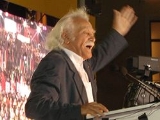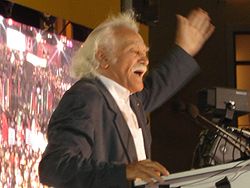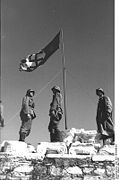
Manolis Glezos
Encyclopedia

Left-wing politics
In politics, Left, left-wing and leftist generally refer to support for social change to create a more egalitarian society...
politician and writer, worldwide known especially for his participation in the World War II
World War II
World War II, or the Second World War , was a global conflict lasting from 1939 to 1945, involving most of the world's nations—including all of the great powers—eventually forming two opposing military alliances: the Allies and the Axis...
resistance
Greek Resistance
The Greek Resistance is the blanket term for a number of armed and unarmed groups from across the political spectrum that resisted the Axis Occupation of Greece in the period 1941–1944, during World War II.-Origins:...
.
1939 - 1945
Born on September 9, 1922 in the village of Apiranthos (or Aperathu), Naxos, Glezos moved to AthensAthens
Athens , is the capital and largest city of Greece. Athens dominates the Attica region and is one of the world's oldest cities, as its recorded history spans around 3,400 years. Classical Athens was a powerful city-state...
in 1935 together with his family, where he finished high school. During his high school years in Athens he also worked as a pharmacy employee. He was admitted to the Higher School of Economic and Commercial Studies (nowadays the Athens University of Economics and Business) in 1940. In 1939, still a high school student, Glezos participated in the creation of an anti-fascist youth group against the Italian occupation of the Dodecanese
Dodecanese
The Dodecanese are a group of 12 larger plus 150 smaller Greek islands in the Aegean Sea, of which 26 are inhabited. Τhis island group generally defines the eastern limit of the Sea of Crete. They belong to the Southern Sporades island group...
and the dictatorship of Ioannis Metaxas
Ioannis Metaxas
Ioannis Metaxas was a Greek general, politician, and dictator, serving as Prime Minister of Greece from 1936 until his death in 1941...
. At the onset of World War II he asked to join the Greek army in the Albanian front against Italy, but he was rejected because he was under age. Instead, he worked as a volunteer for the Hellenic Ministry of Economics. During the Axis occupation of Greece, he worked for the Hellenic Red Cross and the municipality of Athens, while actively involved in the resistance
Greek Resistance
The Greek Resistance is the blanket term for a number of armed and unarmed groups from across the political spectrum that resisted the Axis Occupation of Greece in the period 1941–1944, during World War II.-Origins:...
.

Apostolos Santas
Apostolos Santas commonly known as Lakis, was a Greek veteran of the Resistance against the Axis Occupation of Greece during World War II, most notable for his participation, along with Manolis Glezos, in the taking down of the German flag from the Acropolis on 30 May 1941.Apostolos Santas was...
climbed on the Acropolis
Acropolis, Athens
Acropolis is a neighborhood of Athens, near the ancient monument of Acropolis, along the Dionysios Areopagitis, courier road. This neighborhood has a significant number of tourists all year round. It is the site of the Museum of Acropolis, opened in 2009....
and tore down the swastika
Swastika
The swastika is an equilateral cross with its arms bent at right angles, in either right-facing form in counter clock motion or its mirrored left-facing form in clock motion. Earliest archaeological evidence of swastika-shaped ornaments dates back to the Indus Valley Civilization of Ancient...
, which had been there since April 27, 1941, when the Nazi forces had entered Athens. That was the first resistance act that took place in Greece. It inspired not only the Greeks, but all subjected people, to resist against the occupation, and established them both as two international anti-Nazi heroes. The Nazi regime responded by sentencing Glezos and Santas to death in absentia. Glezos was arrest
Arrest
An arrest is the act of depriving a person of his or her liberty usually in relation to the purported investigation and prevention of crime and presenting into the criminal justice system or harm to oneself or others...
ed by the German occupation forces on March 24, 1942, and he was subjected to imprisonment and torture. As a result of this treatment, he was gravely affected by tuberculosis
Tuberculosis
Tuberculosis, MTB, or TB is a common, and in many cases lethal, infectious disease caused by various strains of mycobacteria, usually Mycobacterium tuberculosis. Tuberculosis usually attacks the lungs but can also affect other parts of the body...
. He was arrested on April 21, 1943 by the Italian occupation forces and spent three months in jail. On February 7, 1944 he was arrested again, this time by Greek Nazi collaborators. He spent another seven and a half months in jail, until he finally escaped on September 21 of the same year.
1946 - 1974

Greek Civil War
The Greek Civil War was fought from 1946 to 1949 between the Greek governmental army, backed by the United Kingdom and United States, and the Democratic Army of Greece , the military branch of the Greek Communist Party , backed by Bulgaria, Yugoslavia and Albania...
, he was put to trial for his political convictions and sentenced to death multiple times by the right-wing government. However, his death sentences were not executed, because of the international public outcry. His death penalties were reduced to a life sentence in 1950. Even though he was still imprisoned, Manolis Glezos was elected member of the Hellenic Parliament in 1951, under the flag of the United Democratic Left
United Democratic Left
The United Democratic Left was a political party in Greece, active mostly before the Greek military junta of 1967-1974.-Foundation:...
, also known as EDA . Upon his election, he went on a hunger strike
Hunger strike
A hunger strike is a method of non-violent resistance or pressure in which participants fast as an act of political protest, or to provoke feelings of guilt in others, usually with the objective to achieve a specific goal, such as a policy change. Most hunger strikers will take liquids but not...
demanding the release of his fellow EDA MPs that were imprisoned or exiled in the Greek islands. He ended his hunger strike upon the release of 7 MPs from their exile. He was released from prison on July 16, 1954. On December 5, 1958 he was arrested and convicted for espionage
Espionage
Espionage or spying involves an individual obtaining information that is considered secret or confidential without the permission of the holder of the information. Espionage is inherently clandestine, lest the legitimate holder of the information change plans or take other countermeasures once it...
, which was common pretext for the persecution of the supporters of the left during the Cold War
Cold War
The Cold War was the continuing state from roughly 1946 to 1991 of political conflict, military tension, proxy wars, and economic competition between the Communist World—primarily the Soviet Union and its satellite states and allies—and the powers of the Western world, primarily the United States...
. His release on December 15, 1962 was a result of the public outcry in Greece and abroad, including winning the Lenin Peace Prize
Lenin Peace Prize
The International Lenin Peace Prize was the Soviet Union's equivalent to the Nobel Peace Prize, named in honor of Vladimir Lenin. It was awarded by a panel appointed by the Soviet government, to notable individuals whom the panel indicated had "strengthened peace among peoples"...
. During his second term of post-war political imprisonment, Glezos was reelected MP with EDA in 1961. At the coup d'état of April 21, 1967, Glezos was arrested at 2 am, together with the rest of the political leaders. During the Regime of the Colonels, the military dictatorship led by George Papadopoulos
George Papadopoulos
Colonel Georgios Papadopoulos was the head of the military coup d'état that took place in Greece on 21 April 1967 and leader of the military government that ruled the country from 1967 to 1974. Papadopoulos was a Colonel of Artillery...
, he suffered yet another four years of imprisonment and exile
Exile
Exile means to be away from one's home , while either being explicitly refused permission to return and/or being threatened with imprisonment or death upon return...
until his release in 1971.
Manolis Glezos' political persecution, from the Second World War to the Greek Civil War
Greek Civil War
The Greek Civil War was fought from 1946 to 1949 between the Greek governmental army, backed by the United Kingdom and United States, and the Democratic Army of Greece , the military branch of the Greek Communist Party , backed by Bulgaria, Yugoslavia and Albania...
and the Regime of the Colonels totals to 11 years and 4 months of imprisonment, and 4 years and 6 months of exile.
Since 1975
After the restoration of democracy in Greece in 1974, Glezos participated in the reviving of EDA. In the elections of 1981 and 1985, he was elected Member of the Greek Parliament, on a Panhellenic Socialist MovementPanhellenic Socialist Movement
The Panhellenic Socialist Movement , known mostly by its acronym PASOK , is one of the two major political parties in Greece. Founded on 3 September 1974 by Andreas Papandreou, in 1981 PASOK became Greece's first social democratic party to win a majority in parliament.The party is a socialist party...
(PASOK) ticket. In 1984 he was elected Member of the European Parliament
European Parliament
The European Parliament is the directly elected parliamentary institution of the European Union . Together with the Council of the European Union and the Commission, it exercises the legislative function of the EU and it has been described as one of the most powerful legislatures in the world...
, again on a PASOK ticket. He was the President of EDA from 1985 until 1989. In the meantime, in 1986, he withdrew from the Parliament, in order to try to implement a grassroots democracy
Grassroots democracy
Grassroots democracy is a tendency towards designing political processes where as much decision-making authority as practical is shifted to the organization's lowest geographic level of organization: principle of subsidiarity....
experiment. He did so in the community of Aperathu, where he was elected as the President of the Community Council in 1986 elections. He then essentially abolished the privileges of the council, introducing a "constitution
Constitution
A constitution is a set of fundamental principles or established precedents according to which a state or other organization is governed. These rules together make up, i.e. constitute, what the entity is...
" and establishing a local assembly
Deliberative assembly
A deliberative assembly is an organization comprising members who use parliamentary procedure to make decisions. In a speech to the electorate at Bristol in 1774, Edmund Burke described the English Parliament as a "deliberative assembly," and the expression became the basic term for a body of...
that had total control over the community administration. This model worked for several years, but in the long term the interest of the rest of his community wore off and the assembly was abandoned. Glezos remained the President until 1989. In the 2000 Greek legislative election he led the list of Synaspismos (in English Coalition) party of the radical left. In 2002, he formed the political group Active Citizens
Active Citizens
Active Citizens is a left-wing political party in Greece and member of the SYRIZA political coalition. Its most prominent delegate is Manolis Glezos, former member of the Hellenic Parliament under the flag of EDA and the man who replaced the Nazi flag with a Greek one on the Acropolis during World...
(which is part of Coalition of the Radical Left
Coalition of the Radical Left
The Coalition of the Radical Left , commonly known by its Greek abbreviation ΣΥΡΙΖΑ , is a coalition of left political parties in Greece...
, an alliance with Synaspismos and other minor parties of the Greek left) and he ran as a candidate prefect for Attica
Attica
Attica is a historical region of Greece, containing Athens, the current capital of Greece. The historical region is centered on the Attic peninsula, which projects into the Aegean Sea...
.
Manolis Glezos has been writing articles in Greek newspapers since 1942 and has been the Editor of the newspapers "Rizospastis
Rizospastis
Rizospastis is the official newspaper of the Communist Party of Greece. It is published daily. It was first published in 1916. Some of the more prominent editors in it are Nikos Boyiopoulos and Liana Kanelli.-Motto:...
" and "I Avgi" in the 1950s. He was awarded the International Award of Journalism in 1958, the Golden Medal Joliot-Curie of the World Peace Council
World Peace Council
The World Peace Council is an international organization that advocates universal disarmament, sovereignty and independence and peaceful co-existence, and campaigns against imperialism, weapons of mass destruction and all forms of discrimination...
in 1959, and the Lenin Peace Prize
Lenin Peace Prize
The International Lenin Peace Prize was the Soviet Union's equivalent to the Nobel Peace Prize, named in honor of Vladimir Lenin. It was awarded by a panel appointed by the Soviet government, to notable individuals whom the panel indicated had "strengthened peace among peoples"...
in 1963. He has also published six books in Greek:
- "The history of the book" («Η ιστορία του βιβλίου», 1974);
- "From Dictatorship to Democracy" («Από τη Δικτατορία στη ∆ηµοκρατία», 1974);
- "The phenomenon of alienation in the language" («Το φαινόµενο της αλλοτρίωσης στη γλώσσα», 1977);
- "The conscience of the rocky earth", («Η συνείδηση της πετραίας γης», 1997).
- "Hydor, Aura, Nero", («Ύδωρ, Αύρα, Νερό», 2001).
- "National Resistance 1940-1945", («Εθνική Αντίσταση 1940-1945», 2006).
Apart from his political work, Glezos has invented a system to prevent flood
Flood
A flood is an overflow of an expanse of water that submerges land. The EU Floods directive defines a flood as a temporary covering by water of land not normally covered by water...
s, combat erosion
Erosion
Erosion is when materials are removed from the surface and changed into something else. It only works by hydraulic actions and transport of solids in the natural environment, and leads to the deposition of these materials elsewhere...
and preserve underground water
Water
Water is a chemical substance with the chemical formula H2O. A water molecule contains one oxygen and two hydrogen atoms connected by covalent bonds. Water is a liquid at ambient conditions, but it often co-exists on Earth with its solid state, ice, and gaseous state . Water also exists in a...
, that works by the constructions of a series of very small dams that redirect water to aquifer
Aquifer
An aquifer is a wet underground layer of water-bearing permeable rock or unconsolidated materials from which groundwater can be usefully extracted using a water well. The study of water flow in aquifers and the characterization of aquifers is called hydrogeology...
s. For his contributions to democracy, to geological sciences, and to linguistics he was pronounced honorary Doctor of Philosophy of the University of Patras
University of Patras
University of Patras is a university established in 1964 in Patras, Greece. Initially housed in the city centre, the university's campus is now located in the adjacent municipality of Rio...
(Department of Geology) in 1996, of the Aristotle University of Thessaloniki
Aristotle University of Thessaloniki
The Aristotle University of Thessaloniki is the largest Greek university, and the largest university in the Balkans. It was named after the philosopher Aristotle, who was born in Stageira, Chalcidice, about 55 km east of Thessaloniki, in Central Macedonia...
(Department of Civil Engineering) in 2001, of the National Technical University of Athens
National Technical University of Athens
The National Technical University of Athens , sometimes simply known as Athens Polytechnic, is among the oldest and most prestigious higher education institutions of Greece....
(School of Mining & Metallurgical Engineering) in 2003, and of the National and Kapodistrian University of Athens
National and Kapodistrian University of Athens
The National and Kapodistrian University of Athens , usually referred to simply as the University of Athens, is the oldest university in Southeast Europe and has been in continuous operation since its establishment in 1837. Today, it is the second-largest institution of higher learning in Greece,...
(School of Philosophy) in 2008.
In March 2010, Glezos was participating in a protest demonstration in Athens, when the Police launched tear gas right into his face. He was carried away injured.

